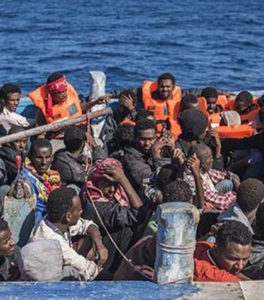Analysis – Europe’s migrant row rumbles on
Europe is debating yet another deal on asylum seekers despite the COVID-19 pandemic exacerbating a swathe of security and humanitarian crises across the Middle-East, Africa and Asia.
Immigration and asylum has been the most politically thorny issue within the European Union since 2015, when a major influx of refugees and other migrants began arriving
 At the time some EU member states refused to accept a quota system for sharing responsibility for displaced persons.
At the time some EU member states refused to accept a quota system for sharing responsibility for displaced persons.
As a result, the European Commission has been caught between the immediate needs of frontline states such as Greece and the countries deeper into the continent who have resisted sharing the load.
Much of Europe’s flow of migrants crosses Greece from Turkey and continues through the Balkans; others traverse the Mediterranean, starting in Libya and ending in Italy, where many reception hubs are overwhelmed.
Yet others are taking a new route from Morocco through the Canary Islands.
Many of the people on the move are trying to find a path north to Norway, Germany and Sweden—countries perceived to have relatively hospitable immigration policies.
After years of division over how to respond, the European Commission has unveiled a plan for member states to share their responsibility for asylum-seekers under a compulsory solidarity mechanism.
Backed by Germany, the pact would require all EU countries to take part and member states would either agree to take in asylum-seekers or take charge of sending back those refused asylum.
Some observers say the crux of the proposal remains the same as the previously proposed ‘Dublin regulation’ which required refugees to claim asylum in their country of arrival and member states would still determine asylum claims in much the same way.
Others say the new pact would accelerate the screening of asylum-seekers at Europe’s borders.
Meanwhile, United Nations agencies have expressed concerns.
The UN High Commissioner for Refugees, Filippo Grande, has urged the EU to respect the basic right to seek refuge under the refugee convention, saying the existing EU approach was ‘unworkable and often resulted in devastating human consequences’.
He also called for common EU action to take responsibility for search and rescue, and for disembarking people rescued at sea.
But worryingly, Greek authorities have recently begun turning back asylum-seekers at the land and sea borders with Turkey, amid Covid-19 restrictions on movement.
Human Rights Watch says that in some cases used violence has been used against asylum-seekers with personal belongings confiscated or destroyed.
The proposed new EU pact undoubtedly will generate debate with several European nations, including Poland, Hungary and Austria, openly resisting any measures to force countries into taking in asylum-seekers – even though all are signatories to the 1951 refugee convention.
So the European Commission is treading fine line in trying to find a less controversial balance between striking an agreement that will please hard-line countries giving them greater flexibility while also serving the needs of frontline member states, such as Greece and Italy.
But the real risk is that not much will change. One view is that the hardliners have won, as the new pact focuses on the immediate deportation of all those not deemed to qualify as refugees.
And there is concern that states will go their own way, in defiance of any compulsory system across the bloc to manage asylum.
Ironically the argument is raging as Germany begins to reap the rewards of its investment in refugees’ skills and integration.












